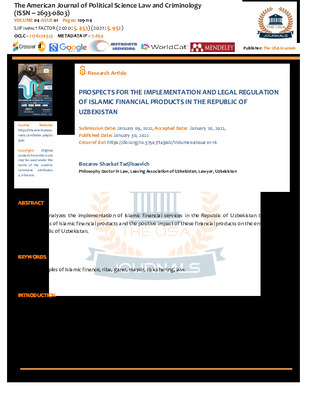Prospects for the implementation and legal regulation of islamic financial products in the republic of uzbekistan
Abstract
This article analyzes the implementation of Islamic financial services in the Republic of Uzbekistan based on the characteristics of Islamic financial products and the positive impact of these financial products on the entire economy of the Republic of Uzbekistan.

Downloads
Philosophy Doctor in Law

Keywords:
Abstract
This article analyzes the implementation of Islamic financial services in the Republic of Uzbekistan based on the characteristics of Islamic financial products and the positive impact of these financial products on the entire economy of the Republic of Uzbekistan.
References
Message from the President of the Republic of Uzbekistan Shavkat Mirziyoyev to the Oliy Majlis. 2020.https: //president.uz/ru/lists/view/4057.
Rakhmanov A.R., Ruziev R.Zh., Rakhmanov A.R. Islamic law. Textbook. BSPU. Ufa. 2010. P.224
Gibadullin M.Z., Vakhitova T.M. Fundamentals of Islamic economics: theory and practice of management. Kazan. TGSPU. 2009. P.8.
Baydaulet E.A. Fundamentals of Ethical (Islamic Finance). Tutorial. Baydaulet. E.A. 2014. P.25.
Mufti Muhammad Taqi Usmani. An introduction to Islamic Finance. 2002. P.111-126.
The Law of the Republic of Uzbekistan “On Leasing”. Statements of the Oliy Majlis of the Republic of Uzbekistan. 1999. No. 5 Art. 108.
Tax Code of the Republic of Uzbekistan. T. Adolat. 2020.





